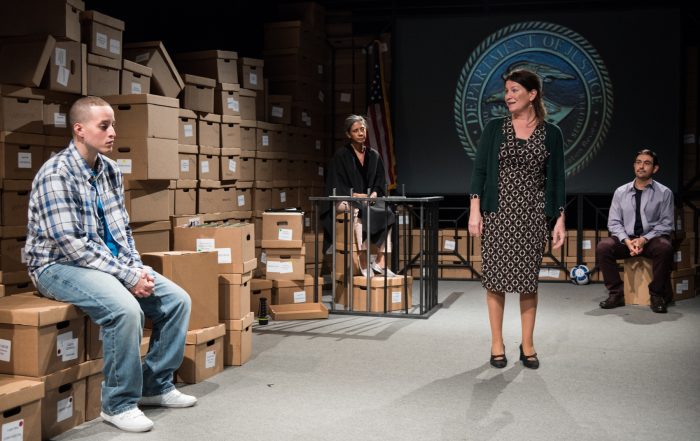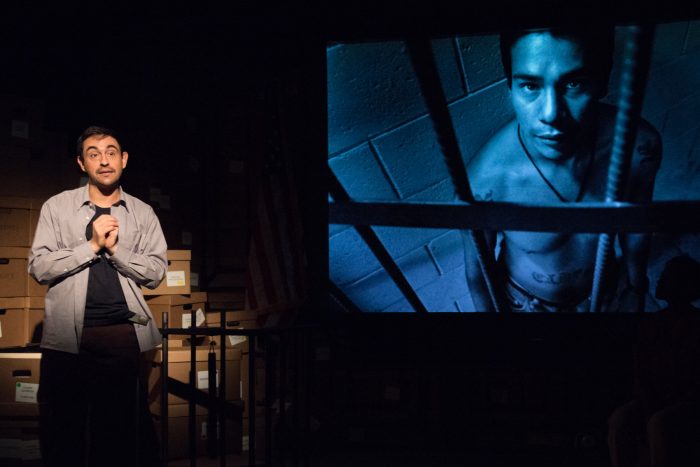

From DE NOVO (Photo by Russ Rowland)
DE NOVO, written and directed by Jeffrey Solomon, is a documentary play that tells the true story of Edgar Chocoy, who seeks asylum in the United States, but ultimately faces deportation. Originally staged in 2010, this production returns thanks to the Houses on the Moon Theater Company. While the play does call attention to a heartbreaking double bind that affects young migrant children, the formulaic storytelling in DE NOVO fails to speak to the Latino community it’s basing its narrative on.
Faithful to the docuplay genre, the story incorporates hard facts into the narrative: its script pulls directly from immigration court transcripts, letters, interviews, police reports, and psychiatric exams. It begins with a stark statistic projected on a screen: “Each year approximately over a quarter of a million children unaccompanied immigrant children are apprehended trying to cross the United States. 90,000 of these children are deported to Mexico without trial.” While those lines point out the horrible and unfair judicial system that bids against those who can’t defend themselves, it also shines a light on the brutal environment that’s taking place in Central America, and the drastic and dangerous measures children have to take for survival.
The screen goes dark. We shift our attention to the stage. Minimal in its design, it’s mounted only by brown filing boxes stacked on top of one another, representing the tens of thousands of files belonging to undocumented and unaccompanied children in deportation procedures. Then a spotlight on the actors: Camilo Almonacid, Manny Ureña, Zuleyma Guevara, and Emily Joy Weiner, who reincarnate the heroes and tormentors orbiting Edgar’s world.


From DE NOVO (photo by Russ Rowland)
Combining live performance and projected photographs from Donna DeCesare, documenting the spread of Los Angeles gangs in Central America, we gain a deeper insight into Edgar’s harsh reality. Through the actors we get to relive his life, the joys and despair, the feeling of hope, the state of uncertainty. With photographs, we access an intimate look into gang life and the sense of belonging it provides for kids devoid of family and community.
The active performance is in motion and high energy, while the photography is still, static, invites contemplation. Both art mediums differ, but complement each other to render a powerful punch in the gut. Edgar is a manifestation of a failed system that has betrayed the children who risk everything to come to the U.S. And like him, there are thousands calling for help.
Unfortunately, Latino audiences may not find the docudrama illuminating, educational, or effective at moving the conversation to unexplored ground. They will not be heavily invested because what they will witness is all too familiar—content full of raw emotion, but packaged in the same way they have seen in nightly news segment on major Spanish-language networks. Full of statistics and burdened with the stereotypical image of a child lacking the educational and economic resources to have the power to reject gangs, we have a one-dimensional and flat characterization of a young boy.


From DE NOVO (Photo by Russ Rowland)
As a first generation Mexican, I’ve lived in New York my entire life. I’ve had the opportunities my parents didn’t back home. For all intents and purposes I’m privileged. I can’t imagine being in Edgar’s shoes and experiencing his persecution. At the same time, I can step away from the narrative and view DE NOVO as an art piece. Part of the fun in going to a play is seeing the drama unfold, building up to the climax, having a cathartic experience. Walking out of the theater I wasn’t riveted, not as much as I thought I’d be. Yes, Edgar is a victim of a failed system that doesn’t care about him. We have known that for a long time.
But the play doesn’t transcend its main tension. It doesn’t point the finger at the ones at fault for the injustice. It’s not daring enough to step outside the box and give us character renditions that we, as Latinos who recognize the struggle of our Central American brothers and sisters, haven’t seen before. There’s the portrait of the concerned mother, but I never see her bear her darkest emotions as somebody in her position would harbor. And then there’s Edgar who falls prey to the MS-13 gang. This play has him be just another number. We know how his story will end and the storytelling, unsurprisingly, takes us there.
For audiences who want to educate themselves in the topic of migrant children and the dilemma they face, this would be a good head start. For Latinos who are versed in the matter, and many of them are, this doesn’t enlighten them. That isn’t to say we shouldn’t highlight the merit of the play. Its politics acknowledge the crude reality of the children who are often left invisible. By featuring real voices right from original transcripts, their stories can finally be heard.
DE NOVO will be playing throughout the coming days until its final performance on December 22nd at Next Door at New York Theatre Workshop (located at 83 East 4th Street) in New York City. Special guests set to appear include Margarita Guzman (Edgar’s mother) and Donna DeCesare, the photojournalist whose work is projected in the play. For more information you can visit their website.
***
Luis Luna works at the Futuro Media Group, producers of Latino USA, In The Thick, America By The Numbers and Humanizing America. after working in the Theatrical Department at GKIDS. He has also worked on the programming teams at various film festivals, including Hamptons International Film Festival, Brooklyn Film Festival, and others. He received a dual B.A. in Film Studies and English from Hunter College. Born and raised in Jackson Heights, his favorite things include queer cinema, world travel, dancing to Rihanna, and a good cemita. Follow Luis on Twitter @luarmanyc.


